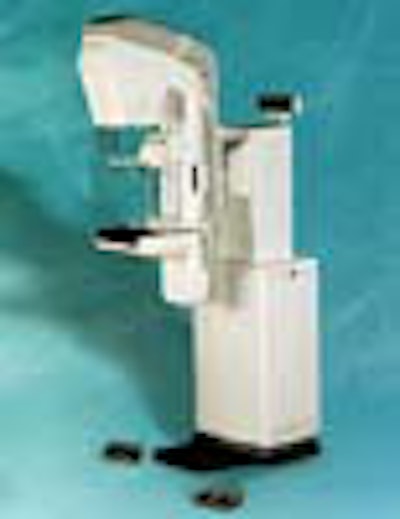
A Food and Drug Administration advisory panel voted unanimously Dec. 16 to recommend approval of a full-field digital mammography system developed by GE Medical Systems. The action paves the way for FDA approval of the system, which could happen as soon as the first quarter of 2000.
At a meeting in Rockville, MD, the radiology devices panel of the FDA's Medical Devices Advisory Committee voted 8-0 in favor of recommending clearance of the premarket approval (PMA) application GE has filed for its Senographe 2000D system. The unit uses an amorphous silicon-based digital detector in place of an analog film-screen system, as found on conventional mammography units.
At the hearing, GE presented data from a clinical study conducted at four universities involving 662 patients. For the studies, researchers acquired digital images with the system and output them to x-ray film for reading, rather than reviewing images in soft-copy form from a computer monitor.
The panel found Senographe 2000D to be both safe and effective, and recommended approval with three conditions:
With the panel's recommendation in hand, Senographe 2000D's application will now go to FDA reviewers for final approval. Although the FDA could reject the application, the agency goes along with panel recommendations in the vast majority of cases, according to agency watchers.
Changing gears
GE's rapid progress with Senographe 2000D is a welcome turnaround for advocates of full-field digital mammography. Just a few months ago, the technology appeared to be in regulatory limbo after the FDA decided against using the 510(k) process to review full-field systems. The agency initially hoped that mammography vendors would use the process to demonstrate that full-field systems are equivalent to conventional film-screen technology.
But the FDA began to rethink its approach when reader variability made it impossible to prove equivalency between the two approaches. The agency is now leaning in favor of requiring PMAs for the technology. The agency's shifting approach proved problematic for one full-field developer, Trex Medical of Danbury, CT, which had its 510(k) application rejected by the agency this year.
GE changed its regulatory approach shortly after the FDA announced that it would probably require PMAs. With the help of FDA officials, the company converted the clinical data it had collected for the 510(k) into a PMA application.
Because the vendor had been aiming to prove the equivalency of Senographe 2000D to film, the company only acquired data regarding hard-copy use. But the FDA advised GE that the data would be adequate for a PMA, at least for hard-copy applications, according to Scott Donnelly, vice president of global technology for the Waukesha, WI, vendor.
"GE and the FDA met and agreed that the data [collected for the 510(k)] was sufficient," Donnelly said. "Both parties felt that the data would prove the safety and effectiveness of the machine, and that getting it on the market was in the interest of women's healthcare."
With approval for hard-copy use of Senographe 2000D at hand, GE now plans to start work on getting approval for the system for soft-copy use, an application that will probably unlock the true potential of digital mammography. The company may also be required to conduct post-approval clinical studies on screening requirements of the system, but won't know about that until the system is approved.
By Brian CaseyAuntMinnie.com staff writer
December 17, 1999
Copyright © 1999 AuntMinnie.com

















